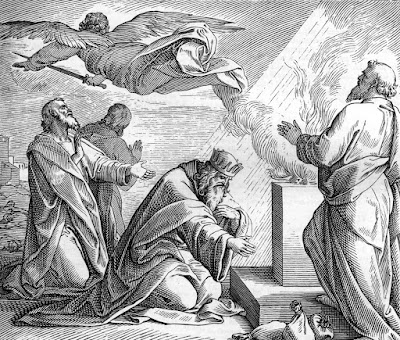Chapter 24 of II Samuel occurs near the end of David’s life. David has served as king for many years. There have been many successes and many failures. And even in the end, as we heard today, David is still not trusting God as he should. David calls for a census of those able to serve in the military—those who would live and die for the nation. And for David this was a sinful act. Why?
Because it was a failure to trust God. The census infringed upon the prerogatives of God who himself keeps the register of those who are to live or die. And so we heard that there would be a consequence of David’s sin. Sin always has consequences. And so there was a plague. And the plague swept through the nation.
The plague began in the late spring during the wheat harvest. And just as the plague was reaching Jerusalem, David approaches the angel of the Lord, there on the threshing floor of Araunah the Jebusite—the place where wheat was processed—where the edible grain is separated from the stalk.
And there David offers himself on behalf of his people: “It is I who have sinned, punish me, spare them.” This is David’s finest hour, is it not? The shepherd king offers himself as a self-sacrifice to spare his people. The good shepherd lays down his life for his flock. David becomes the grain of wheat willing to die, so that his people might live. A beautiful, noble moment for David.
And that’s where our reading stops this morning. But in the final verses of the book of Samuel we read how this very spot, this threshing floor, this place where David offered himself as a sacrifice, will be ordained by God as the place on which his Temple would be built—the altar, the place of worship, that would serve as the locus of religious worship for the next thousand years. And as Jews would come to offer their sacrifices to God in that place, they would recall that they were to emulate David. They weren’t simply making sacrifice of wheat, and animals, they were making sacrifices of themselves.
So too, for Christians, as we gather at the altar, yes, we gather at the cross, that place in which our shepherd king offered sacrifice of himself, but at the same time, we must offer ourselves. As Eucharistic Prayer IV says: “may all who partake of this one Bread and one Chalice, that gathered into one body of the Holy Spirit, they may truly become a living sacrifice in Christ to the praise of your glory”
As we gather at the altar this day, with all of our successes and failures, like David, like all Christians, saints and sinners a like, we offer ourselves, submitting ourselves to the Divine Will, that our lives may be always in service to the glory of God and the salvation of souls.
During this Catholic Schools week, for all young people, for their teachers and catechists and parents who are the first teachers of the faith, and that the truth of the faith may be learned, cherished, and practiced in every Catholic school and Christian home.
For all young people who have fallen into delinquency, through the intercession of St. John Bosco, they may they turn away from sin and crime, and develop a deep love for the ways of Christ.
For all those in prison, for those who struggle with addiction and mental distress, that the healing of Christ may bring them wholeness and the promises of Christ may bring them hope.
For the sick and suffering among us, for those who care for them, and for all of our beloved dead, especially X, for whom this mass is offered.
O God, our refuge and our strength, hear the prayers of your Church, for you yourself are the source of all devotion, and grant, we pray, that what we ask in faith we may truly obtain. Through Christ our Lord.

No comments:
Post a Comment